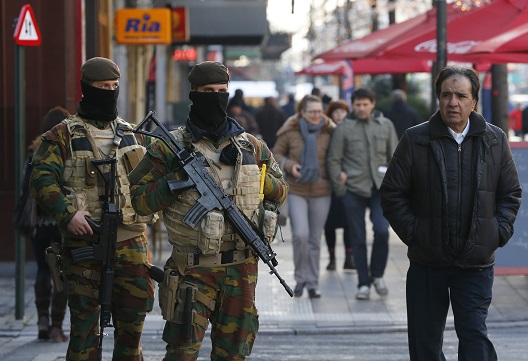 The terrorist attacks that killed scores in Paris and brought down a passenger plane over the Sinai demonstrate a new ISIS tactic and a surprising degree of capability. The operations have been described as an ISIS reaction to the setbacks it is incurring under international and local military pressure in Syria and Iraq. However, there is little evidence that these are the actions of a beleaguered ‘caliphate,’ and the West’s unenthusiastic reaction gives lie to the statements that these attacks are signs that ISIS made a fatal mistake. To ISIS, the coalition air campaign and the limited local competition are not existential threats, but challenges that necessitate innovation and adaption. And as the past few years have shown, ISIS is nothing if not adaptable. The Paris and Sinai attacks—and the high likelihood of future overseas terrorism successes—only show that ISIS is wickedly inventive, at least when compared to its foreign enemies.
The terrorist attacks that killed scores in Paris and brought down a passenger plane over the Sinai demonstrate a new ISIS tactic and a surprising degree of capability. The operations have been described as an ISIS reaction to the setbacks it is incurring under international and local military pressure in Syria and Iraq. However, there is little evidence that these are the actions of a beleaguered ‘caliphate,’ and the West’s unenthusiastic reaction gives lie to the statements that these attacks are signs that ISIS made a fatal mistake. To ISIS, the coalition air campaign and the limited local competition are not existential threats, but challenges that necessitate innovation and adaption. And as the past few years have shown, ISIS is nothing if not adaptable. The Paris and Sinai attacks—and the high likelihood of future overseas terrorism successes—only show that ISIS is wickedly inventive, at least when compared to its foreign enemies.
The Paris attacks seemed to catch France’s leadership in particular off guard. An apparently surprised President Francois Hollande called the attacks an “act of war”—an odd statement given that France declared war on ISIS in September 2014. ISIS analysts and observers, including this author, were also surprised at the sudden bold ISIS operations abroad. Many analysts had believed that ISIS would focus on local operations to defend the caliphate against the air campaigns of the US-led coalition and Russia, rather than provoke still greater foreign military involvement. These analysts did not recognize that the group would use foreign operations as a means of rather than a substitute for defending the ISIS territorial project.
The attacks in Paris and Sinai show us ISIS is evolving. Firstly and most obviously, ISIS has probably established terrorist cells in several other strategic locations, capable of carrying out sophisticated operations with or without close direction from the ISIS leadership in Syria or Iraq. Second, this was probably not a hurried, panicked reaction to ISIS’ woes in Syria and Iraq. The Paris attack in particular was well-planned, and the assets may have been in place for months. The decision to establish a French cell may have been taken as far back as France’s entrance into the anti-ISIS war in 2014, when ISIS was quite clearly not under extreme foreign pressure. It is safe to assume that ISIS will at least try to establish networks in other coalition countries.
The attacks also show that ISIS is as cunning and flexible as ever, and that rather than committing a rash, suicidal error by targeting France and Russia, it may credibly claim the operations as a success. This is evident from the casualties and spectacle achieved, but also from the West’s ensuing reaction—underwhelming government responses coupled with alarming anti-Muslim reactions from some Western publics.
France launched a few dozen air strikes on what must have been secondary ISIS targets, given that the targeting data was immediately available and yet those targets had not been hit yet. For his part, President Barack Obama, who leads the anti-ISIS coalition, made clear the attacks would not significantly change his anti-ISIS strategy. Thus, ISIS launched a spectacular, mass-casualty attack in a Western capital and against an international airliner without incurring any new or increased costs—there is nothing suicidal in this. At the same time, ISIS probably succeeded in boosting morale within its ranks, and perhaps in driving recruitment as well. It most certainly increased suspicion and hostility toward Muslims living in the West, which very much serves its narrative that the West is engaged in a holy war to destroy Islam. The statements from US presidential candidates are a windfall for ISIS’s recruiting campaign.
Going forward, governments will always be tempted to read into ISIS’ actions evidence that their strategy is succeeding. In fact however, all that is known for certain is that the coalition campaign has inflicted casualties on ISIS, disrupted its movements, and undermined some of its revenues, particularly from hydrocarbons. The group continues to control substantial territory, population, and resources, and faces no serious challengers on the ground, Western or otherwise. There is some evidence that the United States is helping bolster a local, Sunni Arab ground force to fight ISIS in eastern Syria. If that effort is scaled up exponentially and the civil war between the opposition and regime ends, local Arab forces may well take and hold ground from ISIS. It is still possible in theory that Iraq’s Shia-dominated political establishment can reconcile with its alienated Sunni population, without which ISIS cannot be defeated. But without a ground force and removing ISIS’s sympathetic support base, ISIS’ opponents have no grounds on which to call the latest attacks desperate or suicidal.
Faysal Itani is a Resident Fellow with the Atlantic Council’s Rafik Hariri Center for the Middle East.
Image: (Photo: Reuters. Belgian soldiers patrol in central Brussels as police searched the area during a continued high level of security following the recent deadly Paris attacks.)
